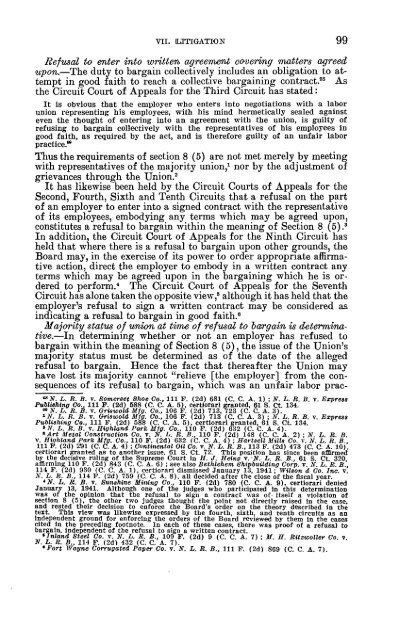NATIONAL LAB RELATIONS BOARD - National Labor Relations ...
NATIONAL LAB RELATIONS BOARD - National Labor Relations ...
NATIONAL LAB RELATIONS BOARD - National Labor Relations ...
You also want an ePaper? Increase the reach of your titles
YUMPU automatically turns print PDFs into web optimized ePapers that Google loves.
VII. [LITIGATION 99Refusal to enter into written agreement covering matters agreedupon.—The duty to bargain collectively includes an obligation to attemptin good faith to reach a collective bargaining contract.33 Asthe Circuit Court of Appeals for the Third Circuit has stated :It is obvious that the employer who enters into negotiations with a laborunion representing his employees, with his mind hermetically sealed againsteven the thought of entering into an agreement with the union, is guilty ofrefusing to bargain collectively with the representatives of his employees ingood faith, as required by the act, and is therefore guilty of an unfair laborpractice.Thus the requirements of section 8 (5) are not met merely by meetingwith representatives of the majority union,1 nor by the adjustment ofgrievances through the Union.2It has likewise been held by the Circuit Courts of Appeals for theSecond, Fourth, Sixth and Tenth Circuits that a refusal on the partof an employer to enter into a signed contract with the representativeof its employees, embodying any terms which may be agreed upon,constitutes a refusal to bargain within the meaning of Section 8 (5).3In addition, the Circuit Court of Appeals for the Ninth Circuit hasheld that where there is a refusal to bargain upon other grounds, theBoard may, in the exercise of its power to order appropriate affirmativeaction direct the employer to embody in a written contract anyterms which may be agreed upon in the bargaining which he is orderedto perform.' The Circuit Court of Appeals for the SeventhCircuit has alone taken the opposite view, 5 although it has held that theemployer's refusal to sign a written contract may be considered asindicating a refusal to bargain in good faith.°Majority status of union at time of refusal to bargain is determinative.—Indetermining whether or not an employer has refused tobargain within the meaning of Section 8 (5), the issue of the Union'smajority status must be determined as of the date of the allegedrefusal to bargain. Hence the fact that thereafter the Union mayhave lost its majority cannot "relieve [the employer] from the consequencesof its refusal to bargain, which was an unfair labor prac-" N. L. R. B. v. Somerset Shoe Co., 111 F. (26) 681 (C. C. A. 1) ; N. L. R. B. v. ExpressPublishing Co., 111F. (2d) 588 (C. C. A. 5), certiorari granted, 61 S. Ct. 134.22 N. L. R. B. v. Griswold Mfg. Co., 106 F. (2d) 713, 723 (C. C. A. 3).I N. L. R. B. v. Griswold Mfg. Co., 106 F. (2d) 713 (C. C. A. 3) ; A'. L. R. B. v. ExpressPublishing Co., 111 F. (2d) 588 (C. C. A. 5), certiorari granted, 61 S. Ct. 134.2 N. L. It. B. v. Highland Park Mfg. Co., 110 F. (2d) 632 (C. C. A. 4).a Art Metal Construction Co. v. N. L. R. B., 110 F. (26) 148 (C. C. A. 2) ; N. L. R. B.V. Highland Park Mfg. Co., 110 F. (26) 632 (C. C. A. 4) ; Hartsell Mills Co. v. N. L. R. B.,111 F. (2d) 291 (C. C. A. 4) ; Continental Oil Co. v. N. L. R. B., 113 F. (2d) 473 (C. C. A. 10),certiorari granted as to another issue, 61 S. Ct. 72. This position has since beenaffirmedby the decisive ruling of the Supreme Court in H. J. Heinz v. N. L. R. B.,61 S. Ct. 320,affirming 110 F. (2d) 843 (C. C. A. 6) ; see also Bethlehem Shipbuilding Corp. V. N. L. R. B.,114 F. (26) 930 (C. C. A. 1), certiorari dismissed January 13, 1941; Wilson cE Co. Inc. V.N. L. R. B., 114 F. (26) 759 (C. C. A. 8), all decided after the close of the fiscal year.4 N. L. R. B. v. Sunshine Mining Co., 110 F. (26) 780 (C. C. A. 9), certiorari deniedJanuary 13, 1941. Although one of the judges who participated in this determinationwas of the opinion that the refusal to sign a contract was of itself a violation ofsection 8 (5), the other two judges thought the point not directly raised in the case,and rested their decision to enforce the Board's order on the theory described in thetext. This view was likewise expressed by the fourth, sixth, and tenth circuits as anindependent ground for enforcing the orders of the Board reviewed by them in the casescited in the preceding footnote. In each of these cases, there was proof of a refusal tobargain, independent of the refusal to sign a written contract.s Inland Steel Co. v. N. L. R. B., 109 F. (2d) 9 (C. C. A. 7) ; M. H. Ritzwoller Co. v.N. L. R. B., 114 F. (2d) 432 (C. C. A. 7).• Fort Wayne Corrugated Paper Co. v. N. L. R. B., 111 F. (26) 869 (C. C. A. 7).
















